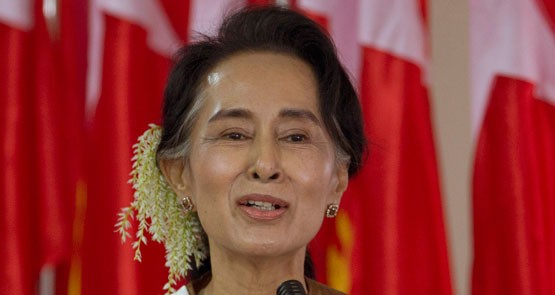
In a historic moment yesterday, Oxford-educated NGO worker Htin Kyaw, the son of one of Myanmar’s most famous poets, was nominated as the country’s first president in a democratic government since the country’s military seized power in a 1962 coup d’etat.
Henry Van Thio, a Christian from the ethnic minority Chin state, was nominated by the NLD in parliament’s upper house.
Under the constitution in Myanmar, the upper and lower houses of parliament, as well as the 25% of seats controlled by the military bloc, can each nominate a vice president. The parliament then votes, but the National League for Democracy will win now that that the party controls both houses. The losing candidates will be vice-presidents. It is unclear when the actual vote will be held, but the new president takes office on April 1.
Despite three intense meetings with military chiefs since the new year, the leader of the National League for Democracy and Nobel Prize-winning laureate Aung Sun Suu Kyi was unable to strike a deal to have the controversial article 59 of the constitution suspended, allowing her to take her place as head of state. The article, which bans anyone with a foreign spouse or foreign-born children — and Suu Kyi’s husband and two sons are all British citizens — from assuming the presidency. The article was drafted especially to keep Suu Kyi out.
But make no mistake, as chairman of the NLD and a minister in the government, she will be its most powerful and influential figure. Indeed, during the election campaign that resulted in a stunning 80% of the vote for the NLD, she claimed that she would be “above the president”, and Htin Kyaw has been described as a”benchwarmer”.
Local press reports have suggested that she will take a position as a minister within the president’s office, allowing her to attend meetings of the National Security Council .
As if taking control of a still largely impoverished nation of 50 million-plus people — in dire need of the most basic infrastructure and services — with no experience in government was not a big enough of a task, Suu Kyi and her team have plenty of thorny issues to deal with.
First up, the military still retains 25% of the seats in both houses of federal parliament and all state and divisional legislatures, as well as the ministries of defence, home and border affairs.
Most immediate are the troubles within many of the the country’s 135 different ethnic groups.
During her years under house arrest and in opposition she was widely criticised for paying little attention to the people from the seven ethnic-based states that surrounded the centre of Myanmar. Yet her party swept to a majority of representation in all states expect western Rakhine, where sectarian violence in 2012 had caused a deep fissure between the local Buddhist and ethnic Muslim Rohinyga. That situation remains unresolved, with at least 200,000 Rohingya effectively locked up in a vast seaside concentration camp.
But the most immediate issue is the full-blown civil war in parts of northern Kachin state.
The warring factions in Kachin did not sign the national peace accord that Suu Kyi’s predecessor Thein Sein desperately wanted to complete as his legacy. The conflict has left tens of thousands of people trapped in internal refugee camps. Fresh fighting has also broken out in recent months in northern Shan state, to the east of Kachin. There have been long-time rumours that the Chinese government is helping to fund rebels in both states, who are ethnic Chinese. Much of the conflict is economic, rather than political, about who gets to trade Myanmar’s riches in logging and gems with the Chinese across the border.
There is also the question of the ongoing influence of ageing former dictator Than Shwe, who officially retired when Thein Sein’s quasi-civilian government came to power in 2010 in an election the NLD refused to contest. Sein and other senior leaders of the outgoing government were reported to have had regular meetings with him at his home in the mountains.
Suu Kyi, who he had locked up under house arrest for the better part of two decades, met with him last December and, according to a statement released by his grandson, gained his support.
“It is the truth that she will become the future leader of the country,” Than Shwe was quoted as saying at the meeting. “I will support her with all of my efforts.”
Yet for all the hard work in front of Myanmar’s enthusiastic but inexperienced new politicians, it is the continued support of the military that will remain Suu Kyi’s top priority; it is a delicate relationship, and the consequences of it failing for the long put-upon people of Myanmar could be devastating.








Crikey is committed to hosting lively discussions. Help us keep the conversation useful, interesting and welcoming. We aim to publish comments quickly in the interest of promoting robust conversation, but we’re a small team and we deploy filters to protect against legal risk. Occasionally your comment may be held up while we review, but we’re working as fast as we can to keep the conversation rolling.
The Crikey comment section is members-only content. Please subscribe to leave a comment.
The Crikey comment section is members-only content. Please login to leave a comment.